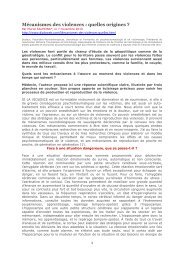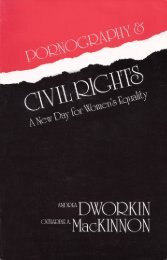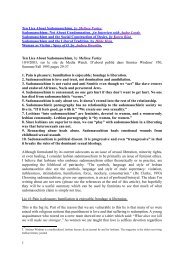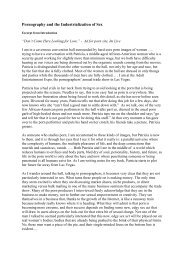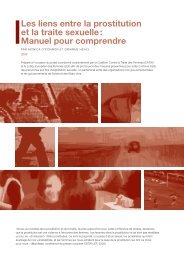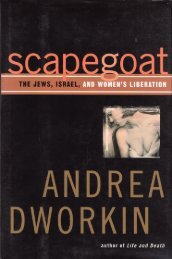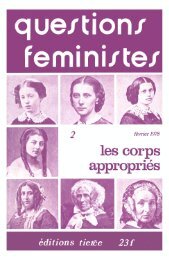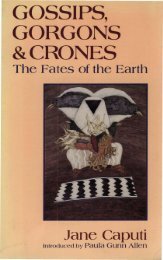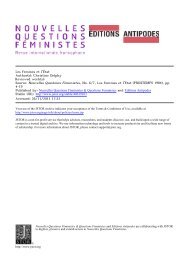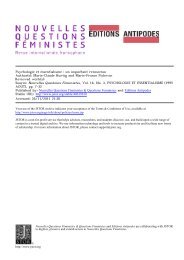xxvisimplistic, words like oppression, exploitation, and domination” (1990, pp. 51–52).Kathleen Barry also criticizes the academic marketplace, the de-funding <strong>of</strong> analyses<strong>of</strong> racism, sexism and class oppression, and the “defeminism <strong>of</strong> women’s studies”(1991, p. 83). “Immense political energy is devoted to seeing that alternatives arenipped in the bud, rendered ridiculous, and never adequately funded,” charges MaryO’Brien with reference to women and health care (1989, p. 213).In her introduction to Feminism/<strong>Postmodernism</strong>, Nicholson definespostmodernists as critical <strong>of</strong> objectivity and neutrality and this is, she claims, “evenmore radical” (1990, p. 3) than the work <strong>of</strong> scholars involved in “other” politicalmovements, including feminism, Marxism, Black and gay liberation. It ispostmodernists, not feminists, who “have extended the field where power hastraditionally been viewed as operating, for example, from the state and the economyto such domains as sexuality and mental health” (1990, p. 4). Thus, at least onecentury <strong>of</strong> div<strong>ers</strong>e feminist scholarship and practice is unrecognized, ignored,rewritten, trivialized. It appears that a certain authoritative consensus is beingpromoted and recirculated, a somewhat totalizing postmodern feminist metanarrativeabout the history and the potential <strong>of</strong> feminism. Curious how the critical practice isnot situated in a study <strong>of</strong> the culture or the epistemology <strong>of</strong> postmodernism.Nicholson believes that postmodernism deconstructs the “God’s eye view” (1990,p. 2, 3) bias <strong>of</strong> an Enlightenment methodology. I believe that Nicholson has readDerrida, but did not recognize him. Yet Nicholson’s book has been well-received byEnlightenment misogynists; as Modleski points out, “postmodern feminists mightwell wish to ponder how they wound up in this new ‘alliance’ with anti-feministhumanism” (1991, p. 14).Gender and Knowledge, Elements <strong>of</strong> a Postmodern Feminism goes one stepbeyond the presentation <strong>of</strong> feminism as an aspect <strong>of</strong> postmodernism, and portrayspostmodernism as the ultimate (post) feminism. But then, “Consent”, as MaryO’Brien ironizes, “relies on a perception by the public that, imperfect though asystem may be, it is the only game in town” (1989, p. 213). And the game here is theabsorption <strong>of</strong> all critical space by postmodernism. Hekman’s project is topostmodernize feminism; h<strong>ers</strong> is not a feminist critique <strong>of</strong> postmodernism, but a“postmodern approach to feminism” (1990, p. 3). It is no longer a question <strong>of</strong>extending postmodernism by adding gender; it is feminism which must be purged bypostmodernism <strong>of</strong> Enlightenment, essentialist, absolutist and foundationalisttendencies. Cartesian epistemology, not class or heterosexuality, is the main enemyhere, and Foucault, Derrida and Gadamer are brought forward to critique feminism.Indeed, Hekman’s major target is not the sexism <strong>of</strong> social and political thought, butthe “women’s way <strong>of</strong> knowing” literature. Daly, Ruddick, Gilligan, Chodorow,Lorde, feminist standpoint theory, the “Marxist feminist camp” (1990, p. 40), the“contradictory” (1990, p. 30) radical feminists, the maternal think<strong>ers</strong>, all aredistinctly less perfect than Derrida and Foucault: “The strongest case for apostmodern feminism can be made through an examination <strong>of</strong> the work <strong>of</strong> Derridaand Foucault” (1990, p. 155). Hekman proposes a “conv<strong>ers</strong>ation <strong>of</strong> mankind”[sic] (1990, p. 9) between feminism and postmodernism (1990, p. 123). In thisTaming <strong>of</strong> the Shrew it seems that only man may speak <strong>of</strong> woman and not be a
iological determinist. Hekman’s assertion that life with men under the darkness <strong>of</strong>postmodernism would be different than under their “Enlightenment” is notconvincing.Modleski finds that “what distinguishes this moment from other moments <strong>of</strong>backlash is the extent to which it has been carried out not against feminism but inits very name” (1991, p. x). Modleski’s “Postmortem on Postfeminism” (1991,pp. 3–22) outlines the literary/political process in which a feminized backlashundermines feminism and deliv<strong>ers</strong> us “back into a prefeminist world” (1991, p. 3).She points to “gynocidal feminisms” (1991, p. 4) fascinated with deconstructions <strong>of</strong>masculinity; ironically feminism is only valued as a “conduit to the morecomprehensive field <strong>of</strong> gender studies” (1991, p. 5).I reject both the postmodernist theory/practice dichotomy as well as the male/theory use <strong>of</strong> female/experience as matter. (The child is usually matricidal anywayand has delusions <strong>of</strong> being self or Father-born.) Fraser and Weedon, among oth<strong>ers</strong>,suggest that if one is truly serious about social change, she must read and use themale bodies <strong>of</strong> work. Surely our activism must be something other than standing asexperts bringing masculine formulations to movement matt<strong>ers</strong>? Bringing maletheory to the women’s movement is not feminist critique or intervention; it is aposition <strong>of</strong> compromise within institutions and a form <strong>of</strong> quietism. It denies andhides the abusiveness <strong>of</strong> the ideology to which it reconciles itself and oth<strong>ers</strong>. JoanScott sees theory as a way <strong>of</strong> ordering experience and determining political practice.We need, says Scott (1988, p. 33), theory that will enable us to think, analyze andarticulate, “And we need theory that will be relevant for political practice. It seemsto me that the body <strong>of</strong> theory referred to as postmodernism best meets all theserequirements” (1988, p. 33). Instead, I argue the best methodology for evaluating thepractice <strong>of</strong> theory that is put before us as what feminists must attend to if we arereally serious about social change is whether it originates from feminist politics andwomen’s experiences. Not a tributary to or coincidence with male philosophy;women must be the matter and the energy: the future. This is what The MilanWomen’s Bookstore Collective suggests in their work, Sexual Difference:This book is about the need to make sense <strong>of</strong>, exalt, and represent in wordsand images the relationship <strong>of</strong> one woman to another. If putting a politicalpractice into words is the same thing as theorizing, then this is a book <strong>of</strong>theory, because the relations between women are the subject matter <strong>of</strong> ourpolitics and this book. It is a book <strong>of</strong> theory, then, but int<strong>ers</strong>p<strong>ers</strong>ed withstories. We believe that to write theory is partly to tell about practice, sincetheoretical reasoning generally ref<strong>ers</strong> to things which already have names.Here we are dealing partly with things that had no names (1990, p. 25).xxviiCertainly, bringing the women’s movement and feminist theory to bear on maleideology and practice is a more risky position, and the Milan Collective takes thoserisks.In (Ex)Tensions, Elizabeth Meese reacts against the charges that feministdeconstructors are fath<strong>ers</strong>’, not moth<strong>ers</strong>’ daught<strong>ers</strong>, and attacks the pione<strong>ers</strong> <strong>of</strong>feminist literary criticism as dominating, severe, austere, restrictive, controlling,
- Page 3: Somer Brodribb teaches feminist the
- Page 6: Spinifex Press Pty Ltd,504 Queensbe
- Page 10 and 11: viiiAnd you get into trouble when y
- Page 12 and 13: xIt is possible to avoid the fate o
- Page 15: Paris, July 14, 1985Dear Mary,Just
- Page 18 and 19: xviH.D. tried to turn the Lord Freu
- Page 20 and 21: xviiiwith and parade a hysterical f
- Page 22 and 23: xxsexual, emotional, political desi
- Page 24 and 25: xxiiAccording to Kristeva, “women
- Page 26 and 27: xxivcharges that political feminism
- Page 30 and 31: xxviiiorthodox. In particular, she
- Page 32 and 33: xxxIn the men’s room(s)When I was
- Page 34 and 35: 2 NOTHING MAT(T)ERSthe post-1945, p
- Page 36 and 37: 4 NOTHING MAT(T)ERSWe cannot afford
- Page 38 and 39: 6 NOTHING MAT(T)ERSStructuralism 5
- Page 40 and 41: 8 NOTHING MAT(T)ERSThere is no clea
- Page 42 and 43: 10 NOTHING MAT(T)ERS“Postmodernis
- Page 44 and 45: 12 NOTHING MAT(T)ERSIn The Postmode
- Page 46 and 47: 14 NOTHING MAT(T)ERSdoubt that we r
- Page 48 and 49: 16 NOTHING MAT(T)ERSmurder which in
- Page 50 and 51: 18 NOTHING MAT(T)ERSmisogyny become
- Page 52 and 53: 20 NOTHING MAT(T)ERS“end of meani
- Page 55 and 56: 2NOTHINGNESS AND DE/GENERATIONSeyto
- Page 57 and 58: NOTHINGNESS AND DE/GENERATION 25is
- Page 59 and 60: NOTHINGNESS AND DE/GENERATION 27tra
- Page 61 and 62: NOTHINGNESS AND DE/GENERATION 29mis
- Page 63 and 64: NOTHINGNESS AND DE/GENERATION 31str
- Page 65 and 66: NOTHINGNESS AND DE/GENERATION 33Bei
- Page 67 and 68: NOTHINGNESS AND DE/GENERATION 35In
- Page 69 and 70: NOTHINGNESS AND DE/GENERATION 37rec
- Page 71 and 72: 3EXISTENCE AND DEATHThe madman jump
- Page 73 and 74: EXISTENCE AND DEATH 41“Man is per
- Page 75 and 76: EXISTENCE AND DEATH 43History has n
- Page 77 and 78: EXISTENCE AND DEATH 45unconscious,
- Page 79 and 80:
EXISTENCE AND DEATH 47[M]y main con
- Page 81 and 82:
EXISTENCE AND DEATH 49Do the workin
- Page 83 and 84:
EXISTENCE AND DEATH 51repudiated hi
- Page 85 and 86:
EXISTENCE AND DEATH 53Discourse was
- Page 87 and 88:
EXISTENCE AND DEATH 55way for when,
- Page 89 and 90:
EXISTENCE AND DEATH 57p. 278). Life
- Page 91 and 92:
EXISTENCE AND DEATH 59‘bodies and
- Page 93 and 94:
EXISTENCE AND DEATH 61de Sade. I ar
- Page 95 and 96:
EXISTENCE AND DEATH 63an eternal re
- Page 97 and 98:
EXISTENCE AND DEATH 65with bravado
- Page 99 and 100:
EXISTENCE AND DEATH 67accompanies h
- Page 101 and 102:
EXISTENCE AND DEATH 69seek access t
- Page 103 and 104:
4NEUTRALITY AND DE/MEANINGAccording
- Page 105 and 106:
NEUTRALITY AND DE/MEANING 73of the
- Page 107 and 108:
NEUTRALITY AND DE/MEANING 75Derrida
- Page 109 and 110:
NEUTRALITY AND DE/MEANING 77Animali
- Page 111 and 112:
NEUTRALITY AND DE/MEANING 79belongs
- Page 113 and 114:
NEUTRALITY AND DE/MEANING 81origin
- Page 115 and 116:
NEUTRALITY AND DE/MEANING 83women,
- Page 117 and 118:
NEUTRALITY AND DE/MEANING 85The ess
- Page 119 and 120:
NEUTRALITY AND DE/MEANING 87laughte
- Page 121 and 122:
5LACAN AND IRIGARAY: ETHICALLACK AN
- Page 123 and 124:
LACAN AND IRIGARAY: ETHICAL LACK AN
- Page 125 and 126:
LACAN AND IRIGARAY: ETHICAL LACK AN
- Page 127 and 128:
LACAN AND IRIGARAY: ETHICAL LACK AN
- Page 129 and 130:
LACAN AND IRIGARAY: ETHICAL LACK AN
- Page 131 and 132:
LACAN AND IRIGARAY: ETHICAL LACK AN
- Page 133 and 134:
LACAN AND IRIGARAY: ETHICAL LACK AN
- Page 135 and 136:
LACAN AND IRIGARAY: ETHICAL LACK AN
- Page 137 and 138:
LACAN AND IRIGARAY: ETHICAL LACK AN
- Page 139 and 140:
LACAN AND IRIGARAY: ETHICAL LACK AN
- Page 141 and 142:
LACAN AND IRIGARAY: ETHICAL LACK AN
- Page 143 and 144:
LACAN AND IRIGARAY: ETHICAL LACK AN
- Page 145 and 146:
LACAN AND IRIGARAY: ETHICAL LACK AN
- Page 147 and 148:
LACAN AND IRIGARAY: ETHICAL LACK AN
- Page 149 and 150:
LACAN AND IRIGARAY: ETHICAL LACK AN
- Page 151 and 152:
6OUT OF OBLIVIONPhilosophy, both id
- Page 153 and 154:
OUT OF OBLIVION 121whose call to th
- Page 155 and 156:
OUT OF OBLIVION 123Figure 1: Egypti
- Page 157 and 158:
OUT OF OBLIVION 125Figure 3: Materi
- Page 159 and 160:
OUT OF OBLIVION 127life and death,
- Page 161 and 162:
OUT OF OBLIVION 129unsettle and soo
- Page 163 and 164:
OUT OF OBLIVION 131Lacan has gone b
- Page 165 and 166:
OUT OF OBLIVION 133(1989, p. 27-28)
- Page 167 and 168:
OUT OF OBLIVION 135in the social re
- Page 169 and 170:
OUT OF OBLIVION 137that anyone can
- Page 171 and 172:
OUT OF OBLIVION 139Figure 5: Kylix
- Page 173 and 174:
OUT OF OBLIVION 141lover, Ariadne,
- Page 175 and 176:
OUT OF OBLIVION 143neutralized and
- Page 177 and 178:
OUT OF OBLIVION 145But Deconstructo
- Page 179:
OUT OF OBLIVION 147recurrent Same.
- Page 182 and 183:
150 NOTHING MAT(T)ERSBarry, Kathlee
- Page 184 and 185:
152 NOTHING MAT(T)ERSCanguilhem, Ge
- Page 186 and 187:
154 NOTHING MAT(T)ERSDerrida, Jacqu
- Page 188 and 189:
156 NOTHING MAT(T)ERSEagleton, Terr
- Page 190 and 191:
158 NOTHING MAT(T)ERSFreud, Sigmund
- Page 192 and 193:
160 NOTHING MAT(T)ERShooks, bell. (
- Page 194 and 195:
162 NOTHING MAT(T)ERSJones, Ann Ros
- Page 196 and 197:
164 NOTHING MAT(T)ERSReality: Femin
- Page 198 and 199:
166 NOTHING MAT(T)ERSMegill, Allan.
- Page 200 and 201:
168 NOTHING MAT(T)ERSPatai, Daphne.
- Page 202 and 203:
170 NOTHING MAT(T)ERSSade, Donatien
- Page 204 and 205:
172 NOTHING MAT(T)ERSThompson, Deni
- Page 206 and 207:
174 NOTHING MAT(T)ERSby Carolyn Bur
- Page 208 and 209:
176 NOTHING MAT(T)ERSDionysus (Bacc
- Page 210:
178 NOTHING MAT(T)ERSPoovey, Mary,



